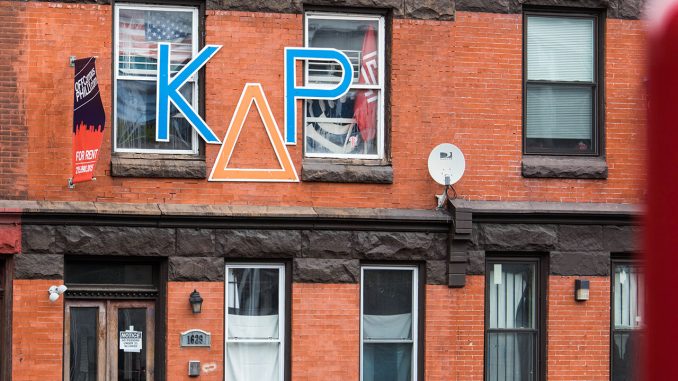
Temple’s Kappa Delta Rho chapter is currently being investigated by the university’s Student Conduct Office for alleged instances of hazing. A separate investigation by the fraternity’s national headquarters was completed last week and found no evidence of hazing practices.
Chris Carey, the senior associate dean of students, said he could not comment on the university’s investigation or the allegation of hazing because the investigation is not “finalized.”
In an email to The Temple News, KDR President and junior political science major Shiven Shah declined to comment on the investigation.
On Feb. 15, Temple was made aware of the hazing allegation, prompting investigations from the fraternity’s national headquarters and the university, said Joseph Rosenberg, the executive director of KDR’s national headquarters.
A pledge spoke to a student employee about the fraternity and allegedly said it “was hard and going to get harder,” Rosenberg said. The student worker interpreted this as a possible hazing claim and anonymously reported it, Rosenberg said.
He added that the report did not list any specific behavior. Carey could not comment on this allegation nor how the university became aware of it.
Rosenberg said he came to Main Campus to conduct the investigation on Feb. 18 and left on Feb. 20. During that time, he said he had “discussions” with 15 members of the fraternity, including its main leadership and pledge class, inside the Student Center.
Rosenberg said he did not visit the fraternity’s house on Diamond Street near 17th while he was on Main Campus last week.
While Rosenberg was on Main Campus, he said he found no evidence of hazing and concluded that the allegation was a “misunderstanding.”
The national headquarters closed its investigation on Feb. 22, two days after Rosenberg left campus, he added.
Carey said the university and the national headquarters investigate “concurrently.” He added that he was not involved with Rosenberg’s discussions with the fraternity’s members last week, but had conversations with Rosenberg about their two investigations.
Carey said university investigations into hazing allegations vary on a case-by-case basis.
“The investigation depends on reports that are received, who’s involved, what information we have,” he said.
“We take any allegations or reports very seriously,” he added. “It’s illegal. It’s against the Student Code of Conduct.”
The Student Conduct Code describes hazing as “any act that endangers the mental or physical health or safety of a person, embarrasses, frightens, or degrades a person or that destroys or removes public or private property, for the purpose of initiation, admission into, or affiliation with, or as a condition for continued membership, in a group, organization or team.”
According to the Conduct Code, even if a victim of hazing expresses or implies consent, that is not a defense against the practice.
Hazing is a third-degree misdemeanor in Pennsylvania, according to Pennsylvania’s law prohibiting hazing.
KDR was established at Temple in 1984, but became inactive in 1998 and then reorganized at Main Campus in 2009, according to the national headquarters’ website.
According to the Fall 2017 Fraternity and Sorority Report, which provides data about all Greek organizations at the university, Kappa Delta Rho has 50 total members and a cumulative GPA of 3.04.
This semester, 22 students joined the fraternity, Shah said.
He added that the fraternity raised $550 last semester for charity. He said by the end of the week, the fraternity will have completed 550 community service hours this academic year.
The university uses Diamond Accreditation to rank Greek life based on standards, like average GPA, completing hazing acknowledgment and new member paperwork and attending risk management workshops. KDR has a Diamond Accreditation score of two, which is the minimum score needed to be recognized by the university and receive student organization benefits.
Such benefits allow KDR to request up to $2,500 from Temple Student Government Allocations. It also allows the fraternity to apply for the Student Organization Security Fee Fund, which subsidizes costs of staffing a philanthropic event of more than 200 people with security provided by Campus Safety Services.
Rosenberg said he appreciates the student worker who alerted the university about the alleged hazing.
“We take any allegation seriously,” he said. “We investigate it. We want to hold our members accountable.”



Be the first to comment